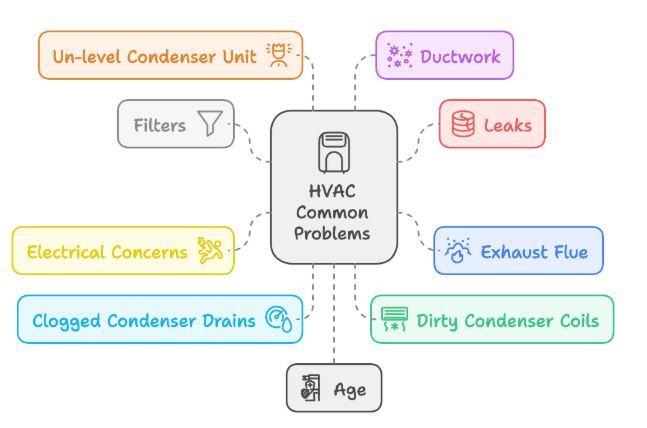HVAC Making a Loud Noise? Problems Found During Home Inspections
Is your HVAC making a loud noise or maybe whistling? If so, it might be a good idea to get an inspection to troubleshoot the problem. Read on to see what the professionals at A.J. Perri check during a home inspection to narrow down the problem of why your HVAC suddenly got so loud.

HVAC Troubleshooting: The Most Common Problems Found During Home Inspections
- Filters: If filters aren’t changed regularly, air flow can become blocked, causing problems with heating and cooling functions.
- Leaks: Any leak can be a precursor to a larger problem, like a cracked heat exchanger. The heat exchanger converts fuel to heat and if it’s broken, it can release dangerous gas into the air. A leak in the cooling system can allow the escape of refrigerant or gas and can be potentially dangerous.
- Exhaust flue: This is a vent for the exhaust byproducts to be moved out of the house and released outside. The exhaust flue needs to slope up to an outdoor vent or chimney with proper support and must be kept away from flammable materials.
- Electrical concerns: Homes with electrical problems are likely to blow a fuse or trip a breaker during times of heavy heating or cooling use. It’s also important to have an electrical kill switch located close to the furnace so power can be cut immediately in case of an emergency. If you suspect electrical concerns, speak with a professional about system repair solutions.
- Clogged condenser drains: Condensation collects during an air conditioner’s cooling process and is often removed through a drain hose. If the drain hose becomes clogged, the condensation will back up and cause moisture issues. Common causes of clogged condenser drains include leaves, dirt, pollen, mold, algae, hair, and dust.
- Dirty condenser coils: Dirty condenser coils can restrict air flow and lower your energy efficiency. Keep plants and other obstructions at least one foot away from the unit.
- Un-level condenser unit: The pad that the outside condenser unit sits on should be within 10 degrees of level. Being un-level reduces the effectiveness of lubrication in the tubing and increases stress on refrigerant lines.
- Ductwork: Air ducts that are improperly installed, cracked, or have broken connections send heated or cooled air into attics and walls instead of the intended rooms. Dirty air ducts can also pose a problem and possible risks. Children can also pose a risk to themselves and the system by sticking objects into the registers.
- Age: Most heating and cooling equipment has a life expectancy of 10–20 years. However, you can extend the life of this equipment by having it regularly maintained.
If you are concerned about your HVAC system or are hearing strange sounds, call us at 732-733-2541 or schedule service with A.J. Perri in New Jersey today!
Professional Maintenance is Key
It’s important to keep up with your HVAC maintenance year-round to avoid unnecessary problems and issues. Have your HVAC system inspected by a licensed technician at least once a year. For professional advice, ask A.J. Perri! We have the know-how to keep your home comfortable all year long.
